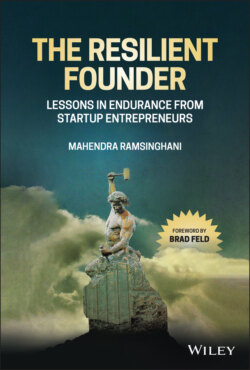Читать книгу The Resilient Founder - Mahendra Ramsinghani - Страница 15
Introduction The Despondent Founder
ОглавлениеIn the mythological epic, Mahabharata, the narrative begins with its warrior-hero despondent, dejected, and frozen in the middle of a battlefield. Enemy armies surround him. He needs to act. Yet he is overwhelmed. Written in circa fourth century BC, such a timeless story about a warrior-hero, could very well be about the modern day entrepreneur.1 One who often feels lost, confused, and despondent. Unable to apply his mind, stuck in a funk. Like a Formula One race car that sputters and coasts slowly to the side, he stalls.
Meanwhile, the commercial battle rages on. Payroll needs to be managed, cash is low, competitors are chomping at the bit, and the team needs motivation and guidance.
Why do entrepreneurs make a conscious choice to jump into the battlefield, to put themselves in positions that most would not dare to? We know that at a deep level, all entrepreneurs are fundamentally abnormal, even irrational, because rational people rarely try to change the world. The irrational spirit is aching to fill a void, both in their psyches and in society. They suffer from cognitive dissonance, which is a fancy term for beliefs or behavior that are inconsistent. The odds are stacked against them. Start-ups fail at a very high rate, as much as 90% or more, yet entrepreneurs choose this path. We wonder why.
Working against all possible odds and every possible challenge, the founder chooses this form of self-torture in promise of a reward. She decides to leap over hurdles of innovation and technological development, building teams, gathering resources, selling products, ensuring growth, retaining healthy gross margins, defending her turf against competition. Under immense pressure to perpetually grow at a rapid pace, start-up founders are encouraged, expected, and cheered on to pump up revenues and valuation to keep the motivation and the momentum. If growth drops, everything scatters. People escape. Investors flee. Down rounds occur, and the company is declared as damaged goods. Pressure extends over into publicly traded companies, as the CEOs live and die by their quarterly earnings guidance.
While aiming for hypergrowth, the founder undergoes a stressful journey managing the unknowns of developing products, go-to-market tactics, managing sales momentum, attracting high-performing teams, raising capital, fending off acquirers, and beating the competition. If start-ups are the new war zones, the founder is not fully prepared to wield the weapons with courage, and finds herself pushed over the top, burned out, exhausted, afraid – a wounded soldier. Those who chanted the “move fast and break things” mantra find their own psyches broken. Founders have now started to open up and publicly describe the toll of the start-up journey.
I recently chose to step down as CEO of the technology company I co-founded … It wasn't an easy decision; ongoing struggles with mental illness and a desire to prioritize my mental health were the primary drivers of this choice.
— Matthew Cooper, co-founder, Earnup 2
In my research for this book, over 150 founders and business leaders opened up to share their own journeys in these dark domains of stress and depression. They have provided answers, which have been encapsulated into these chapters.
The following pages are voices of the founders who have often struggled to understand how to seek help, while being at odds with the demands and realities of running their businesses. Should we soldier on silently, fighting these demonic battles alone? How should we seek therapy in the chest-thumping, macho, passion-driven start-up world? How should we respond to the classical loaded question–answer greeting “So, how is it going? Crushing it, aren't you?”
Should we “always be crushing it” and then one day our selves feel crushed? Simone Weil, the French philosopher, urged that the only suitable question to ask another human being was, “What are you going through?”
